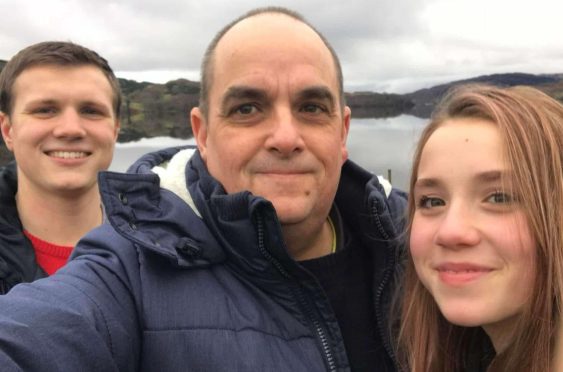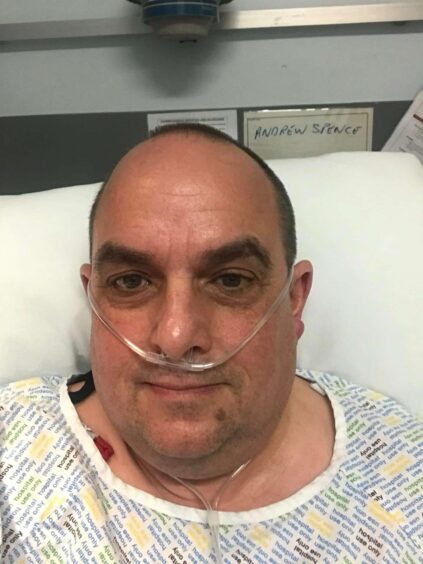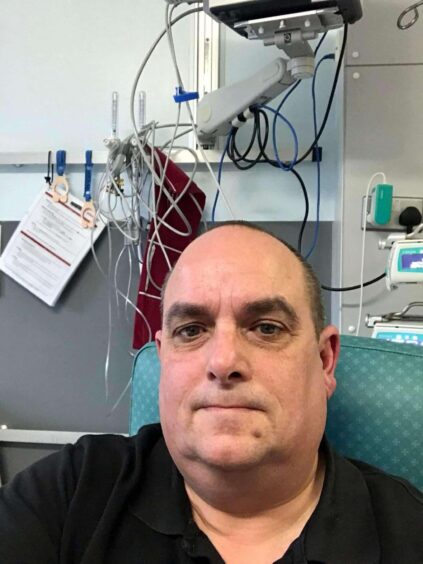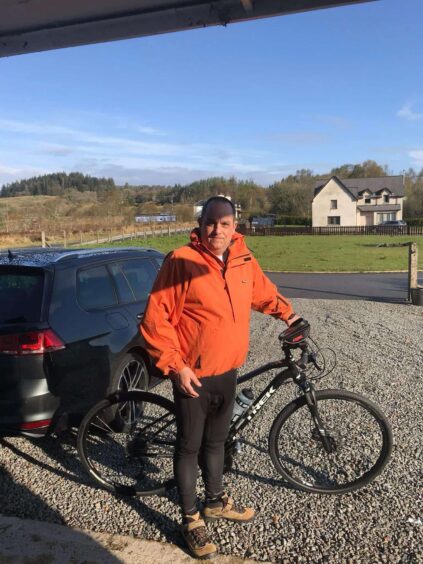When Andrew Spence first began feeling unwell, he initially dismissed it as simple bloating and discomfort.
However, after an emergency admission to Oban Hospital, he was rushed into surgery within hours to have a blockage in his bowel removed.
Following the life-saving operation, Andrew awoke to a new reality – and in the weeks and months that followed, he had to come to terms with living with a stoma.
At the time, in November 2017, he had just begun a new role as the chief executive of BID4Oban.
Now 59, Andrew shares his story to offer support and hope to others facing similar “life-changing” surgeries, reassuring them that a stoma does not signal the end of their lives, but rather the beginning of a new chapter.
Six-and-a-half hours at Oban Hospital for stoma operation
Speaking to The Press and Journal about his experience, the father-of-two explained how he was unwell for two weeks before being admitted to hospital.
“My abdomen was hard, and I wasn’t able to pass anything through my body. That morning I woke up in pain, I have never had anything like it,” he said.
“My son Thomas came to take me to the GP, and I was taken from the surgery straight to accident and emergency. Very quickly it was established that I had diverticular disease.
“I was then taken up to the ward and admitted. The surgeon then came to speak to me and said that I needed a life-saving operation.
“I needed the operation so urgently I only had 30 minutes to speak to Thomas and my daughter Anna to explain what was happening.”
He added: “The surgeon warned me that I was almost certainly facing a stoma, but you don’t really know what that means until you have one.”
Andrew was in surgery for six-and-a-half hours, during which 16 inches of his bowel was removed.
He remained in the hospital for two weeks as he adjusted to life with his stoma, a surgically-created opening in the abdomen that allows waste to exit the body into a bag.
He said: “The nurse on the ward was brilliant, she got me to clean out and manage my bag from the very beginning.”
In the days following the operation, he became seriously unwell.
He said: “When Father James came in and offered me mass and communion in the hospital, I knew I was ill.
“But his visit turned me a round.”
‘Hope and support’ are key for dealing with stoma
Andrew, who was off work for two months after his operation, describes “hope and support” as the two key tools in getting well when living with a stoma.
He said: “The first six weeks are exhausting because it is all new. People are frightened that the bag smells, that there will be leaks, or that you will not be able to live your life again.
“But the more positive people are about it, the more people will be able to live a full and healthy life.
“There are difficult days especially when you have an accident. Sometimes you need to make light of it, to get through it. Stoma humour!”
Andrew’s attitude towards his stoma bag is inspiring.
“I would suggest that anyone who has a stoma should be upfront with people about it. On one of my first days back at work, I had to go to a council meeting, and the bag was farting like a Gaelic song,” he said.
“The first time I had a curry I had to stop three times on the way from Fort William to Oban, simply to let gas out of the bag.
“There is also a ‘phantom poo’ situation which is common for people. But rest assured, nothing is coming out of your bottom when you have a bag.
“So you just need to tell people.”
Andrew had recovered so well by the next May following his operation that he took on a fundraising challenge cycling from Oban to Inverness for Lorn and Islands Hospital raising £1,250.
He joked: “And because of the bag, I didn’t need to look for a toilet.”
In Andrew’s case, he was able to undergo an operation to reverse the stoma. However that didn’t go quite as planned.
On the first attempt, he ended up with a loop ileostomy, which creates a stoma in the abdomen to divert waste from a damaged or obstructed part of the intestines.
He said: “That was difficult to accept, and at the same time I got sepsis so I was very ill. With the loop ileostomy, I struggled to adapt.
“It seemed to leak more, and as soon as you eat it appeared in the bag.”
The following year, surgeons tried again and this time their efforts were successful.
Andrew said having his bowel working again was akin to “riding a bike”.
Since recovery, he has tried to support as many people as he can – in person and on social media – to show that there is a future and a way to live well with a stoma.
He said: “Of course, there is anxiety around living with a colonoscopy and with a bag.
“But you need to be brave – you have a life to live.”
Have you signed up for our Oban and Hebrides newsletter?
Every week our Oban-based reporter Louise Glen curates the best news in the area.
Sign up here for local news straight to your inbox.




Conversation